NRS223 Report: Interdisciplinary Referral and Discussion Analysis
VerifiedAdded on 2022/10/19
|6
|1418
|267
Report
AI Summary
This report presents an analysis of an ISBAR (Identify, Situation, Background, Assessment, Recommendation) referral to an occupational therapist for a 48-year-old female patient, Mrs. Helena Jones, diagnosed with Multiple Sclerosis and other chronic conditions. The report details the patient's condition, including physical limitations, current medications, and specific needs. It justifies the selection of an occupational therapist within an interdisciplinary healthcare team, emphasizing the importance of collaborative care in managing chronic illnesses. The discussion highlights how an occupational therapist can assist Mrs. Jones in performing daily activities, improving skills, and adapting her environment to meet her needs. The report underscores the significance of collaborative healthcare practices in managing the symptoms of Multiple Sclerosis and improving the patient's overall quality of life.

Running head: REPORT
NRS223 201960 Essential nursing care: chronic and complex nursing
Name of the Student
Name of the University
Subject code
Due date
Lecture’s name
Student number
Author Note
NRS223 201960 Essential nursing care: chronic and complex nursing
Name of the Student
Name of the University
Subject code
Due date
Lecture’s name
Student number
Author Note
Paraphrase This Document
Need a fresh take? Get an instant paraphrase of this document with our AI Paraphraser
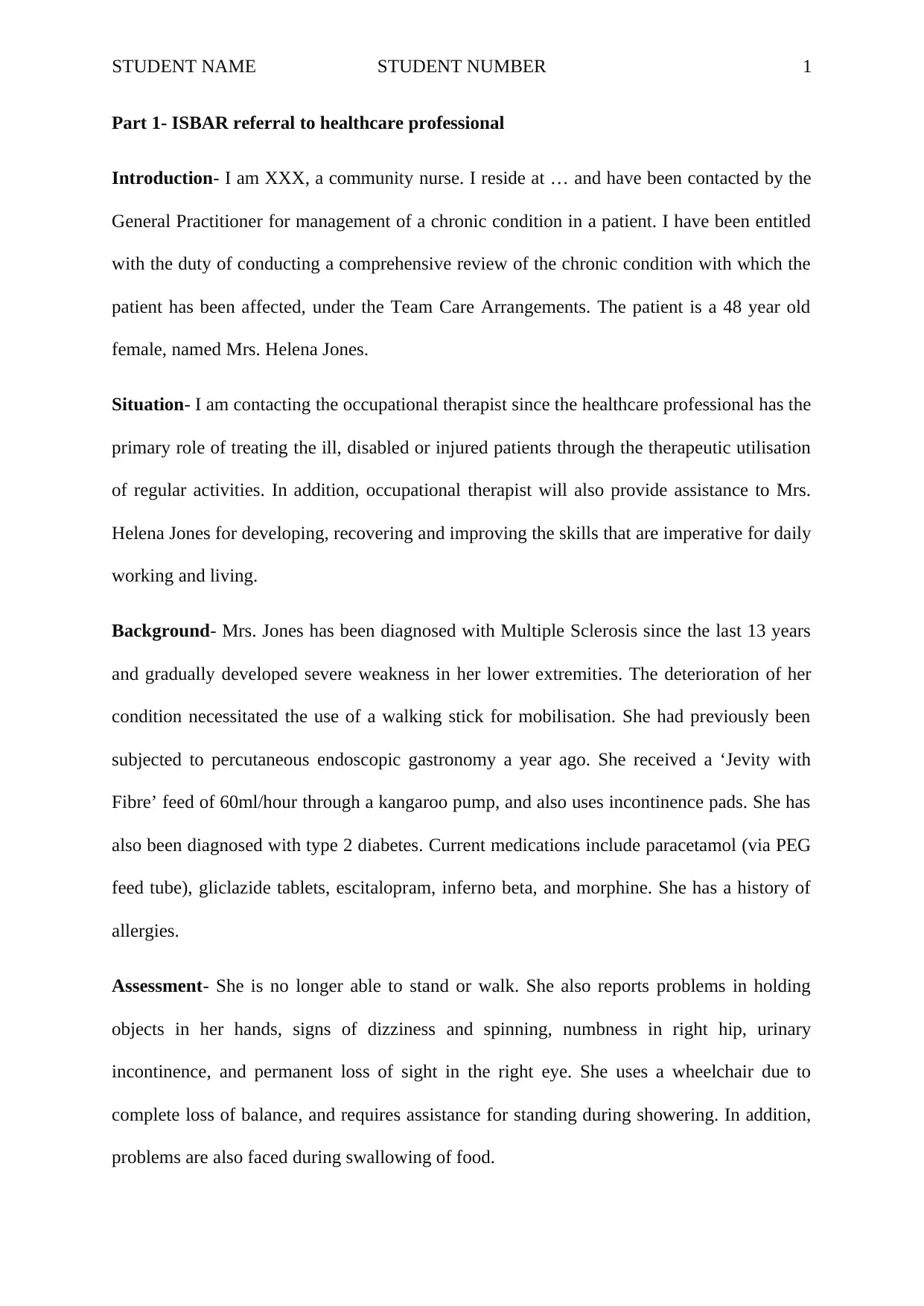
STUDENT NAME STUDENT NUMBER 1
Part 1- ISBAR referral to healthcare professional
Introduction- I am XXX, a community nurse. I reside at … and have been contacted by the
General Practitioner for management of a chronic condition in a patient. I have been entitled
with the duty of conducting a comprehensive review of the chronic condition with which the
patient has been affected, under the Team Care Arrangements. The patient is a 48 year old
female, named Mrs. Helena Jones.
Situation- I am contacting the occupational therapist since the healthcare professional has the
primary role of treating the ill, disabled or injured patients through the therapeutic utilisation
of regular activities. In addition, occupational therapist will also provide assistance to Mrs.
Helena Jones for developing, recovering and improving the skills that are imperative for daily
working and living.
Background- Mrs. Jones has been diagnosed with Multiple Sclerosis since the last 13 years
and gradually developed severe weakness in her lower extremities. The deterioration of her
condition necessitated the use of a walking stick for mobilisation. She had previously been
subjected to percutaneous endoscopic gastronomy a year ago. She received a ‘Jevity with
Fibre’ feed of 60ml/hour through a kangaroo pump, and also uses incontinence pads. She has
also been diagnosed with type 2 diabetes. Current medications include paracetamol (via PEG
feed tube), gliclazide tablets, escitalopram, inferno beta, and morphine. She has a history of
allergies.
Assessment- She is no longer able to stand or walk. She also reports problems in holding
objects in her hands, signs of dizziness and spinning, numbness in right hip, urinary
incontinence, and permanent loss of sight in the right eye. She uses a wheelchair due to
complete loss of balance, and requires assistance for standing during showering. In addition,
problems are also faced during swallowing of food.
Part 1- ISBAR referral to healthcare professional
Introduction- I am XXX, a community nurse. I reside at … and have been contacted by the
General Practitioner for management of a chronic condition in a patient. I have been entitled
with the duty of conducting a comprehensive review of the chronic condition with which the
patient has been affected, under the Team Care Arrangements. The patient is a 48 year old
female, named Mrs. Helena Jones.
Situation- I am contacting the occupational therapist since the healthcare professional has the
primary role of treating the ill, disabled or injured patients through the therapeutic utilisation
of regular activities. In addition, occupational therapist will also provide assistance to Mrs.
Helena Jones for developing, recovering and improving the skills that are imperative for daily
working and living.
Background- Mrs. Jones has been diagnosed with Multiple Sclerosis since the last 13 years
and gradually developed severe weakness in her lower extremities. The deterioration of her
condition necessitated the use of a walking stick for mobilisation. She had previously been
subjected to percutaneous endoscopic gastronomy a year ago. She received a ‘Jevity with
Fibre’ feed of 60ml/hour through a kangaroo pump, and also uses incontinence pads. She has
also been diagnosed with type 2 diabetes. Current medications include paracetamol (via PEG
feed tube), gliclazide tablets, escitalopram, inferno beta, and morphine. She has a history of
allergies.
Assessment- She is no longer able to stand or walk. She also reports problems in holding
objects in her hands, signs of dizziness and spinning, numbness in right hip, urinary
incontinence, and permanent loss of sight in the right eye. She uses a wheelchair due to
complete loss of balance, and requires assistance for standing during showering. In addition,
problems are also faced during swallowing of food.
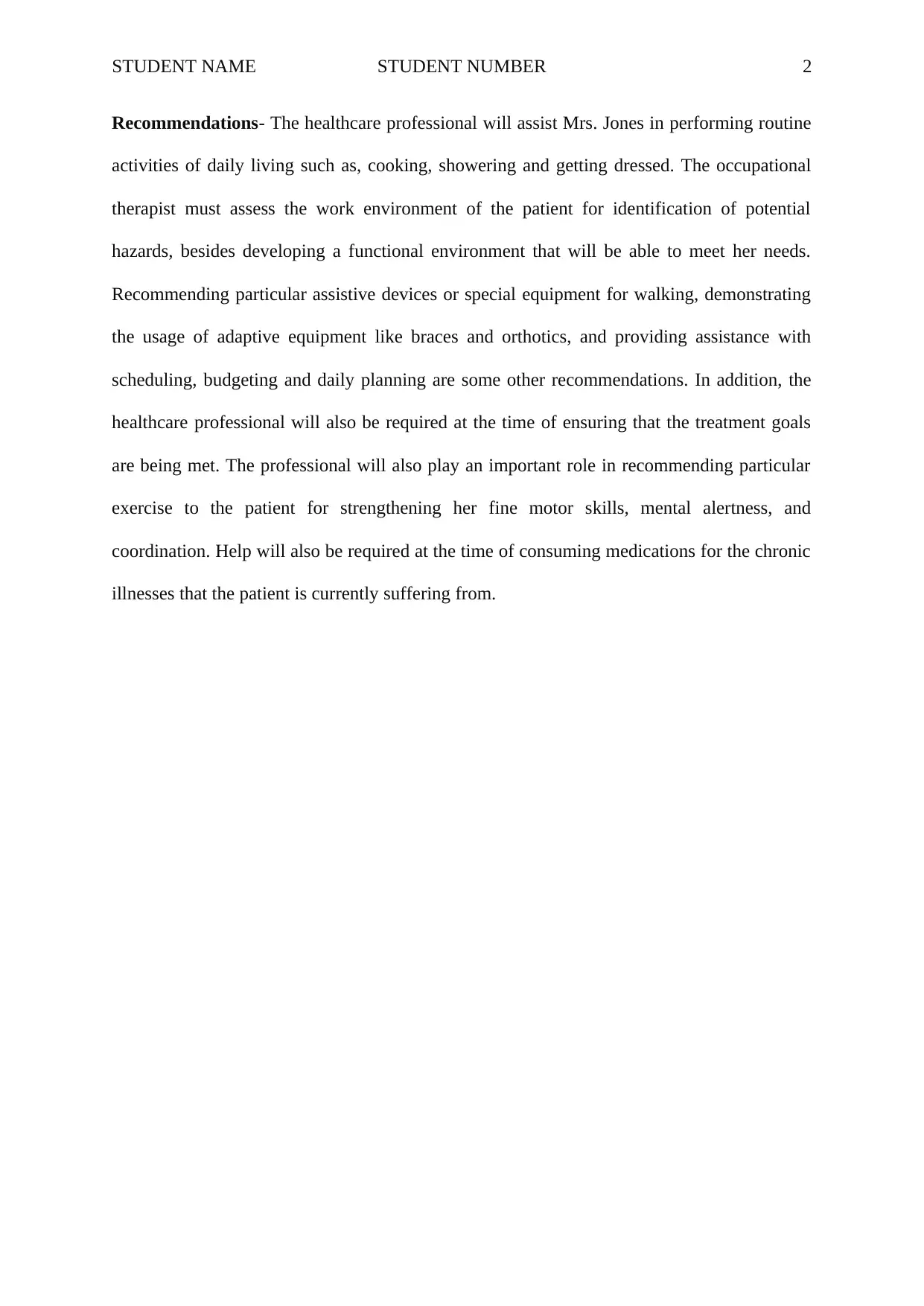
STUDENT NAME STUDENT NUMBER 2
Recommendations- The healthcare professional will assist Mrs. Jones in performing routine
activities of daily living such as, cooking, showering and getting dressed. The occupational
therapist must assess the work environment of the patient for identification of potential
hazards, besides developing a functional environment that will be able to meet her needs.
Recommending particular assistive devices or special equipment for walking, demonstrating
the usage of adaptive equipment like braces and orthotics, and providing assistance with
scheduling, budgeting and daily planning are some other recommendations. In addition, the
healthcare professional will also be required at the time of ensuring that the treatment goals
are being met. The professional will also play an important role in recommending particular
exercise to the patient for strengthening her fine motor skills, mental alertness, and
coordination. Help will also be required at the time of consuming medications for the chronic
illnesses that the patient is currently suffering from.
Recommendations- The healthcare professional will assist Mrs. Jones in performing routine
activities of daily living such as, cooking, showering and getting dressed. The occupational
therapist must assess the work environment of the patient for identification of potential
hazards, besides developing a functional environment that will be able to meet her needs.
Recommending particular assistive devices or special equipment for walking, demonstrating
the usage of adaptive equipment like braces and orthotics, and providing assistance with
scheduling, budgeting and daily planning are some other recommendations. In addition, the
healthcare professional will also be required at the time of ensuring that the treatment goals
are being met. The professional will also play an important role in recommending particular
exercise to the patient for strengthening her fine motor skills, mental alertness, and
coordination. Help will also be required at the time of consuming medications for the chronic
illnesses that the patient is currently suffering from.
⊘ This is a preview!⊘
Do you want full access?
Subscribe today to unlock all pages.

Trusted by 1+ million students worldwide
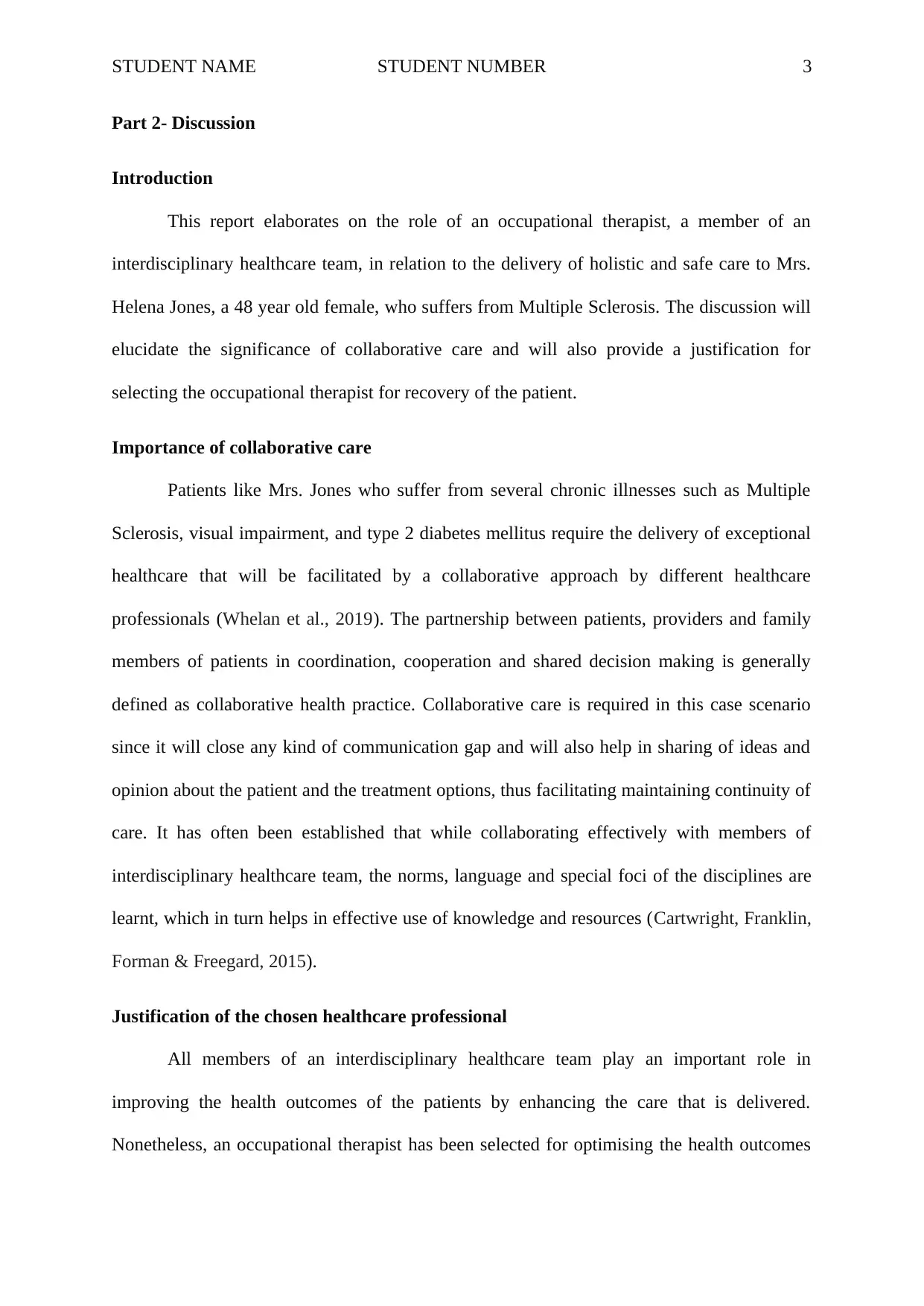
STUDENT NAME STUDENT NUMBER 3
Part 2- Discussion
Introduction
This report elaborates on the role of an occupational therapist, a member of an
interdisciplinary healthcare team, in relation to the delivery of holistic and safe care to Mrs.
Helena Jones, a 48 year old female, who suffers from Multiple Sclerosis. The discussion will
elucidate the significance of collaborative care and will also provide a justification for
selecting the occupational therapist for recovery of the patient.
Importance of collaborative care
Patients like Mrs. Jones who suffer from several chronic illnesses such as Multiple
Sclerosis, visual impairment, and type 2 diabetes mellitus require the delivery of exceptional
healthcare that will be facilitated by a collaborative approach by different healthcare
professionals (Whelan et al., 2019). The partnership between patients, providers and family
members of patients in coordination, cooperation and shared decision making is generally
defined as collaborative health practice. Collaborative care is required in this case scenario
since it will close any kind of communication gap and will also help in sharing of ideas and
opinion about the patient and the treatment options, thus facilitating maintaining continuity of
care. It has often been established that while collaborating effectively with members of
interdisciplinary healthcare team, the norms, language and special foci of the disciplines are
learnt, which in turn helps in effective use of knowledge and resources (Cartwright, Franklin,
Forman & Freegard, 2015).
Justification of the chosen healthcare professional
All members of an interdisciplinary healthcare team play an important role in
improving the health outcomes of the patients by enhancing the care that is delivered.
Nonetheless, an occupational therapist has been selected for optimising the health outcomes
Part 2- Discussion
Introduction
This report elaborates on the role of an occupational therapist, a member of an
interdisciplinary healthcare team, in relation to the delivery of holistic and safe care to Mrs.
Helena Jones, a 48 year old female, who suffers from Multiple Sclerosis. The discussion will
elucidate the significance of collaborative care and will also provide a justification for
selecting the occupational therapist for recovery of the patient.
Importance of collaborative care
Patients like Mrs. Jones who suffer from several chronic illnesses such as Multiple
Sclerosis, visual impairment, and type 2 diabetes mellitus require the delivery of exceptional
healthcare that will be facilitated by a collaborative approach by different healthcare
professionals (Whelan et al., 2019). The partnership between patients, providers and family
members of patients in coordination, cooperation and shared decision making is generally
defined as collaborative health practice. Collaborative care is required in this case scenario
since it will close any kind of communication gap and will also help in sharing of ideas and
opinion about the patient and the treatment options, thus facilitating maintaining continuity of
care. It has often been established that while collaborating effectively with members of
interdisciplinary healthcare team, the norms, language and special foci of the disciplines are
learnt, which in turn helps in effective use of knowledge and resources (Cartwright, Franklin,
Forman & Freegard, 2015).
Justification of the chosen healthcare professional
All members of an interdisciplinary healthcare team play an important role in
improving the health outcomes of the patients by enhancing the care that is delivered.
Nonetheless, an occupational therapist has been selected for optimising the health outcomes
Paraphrase This Document
Need a fresh take? Get an instant paraphrase of this document with our AI Paraphraser
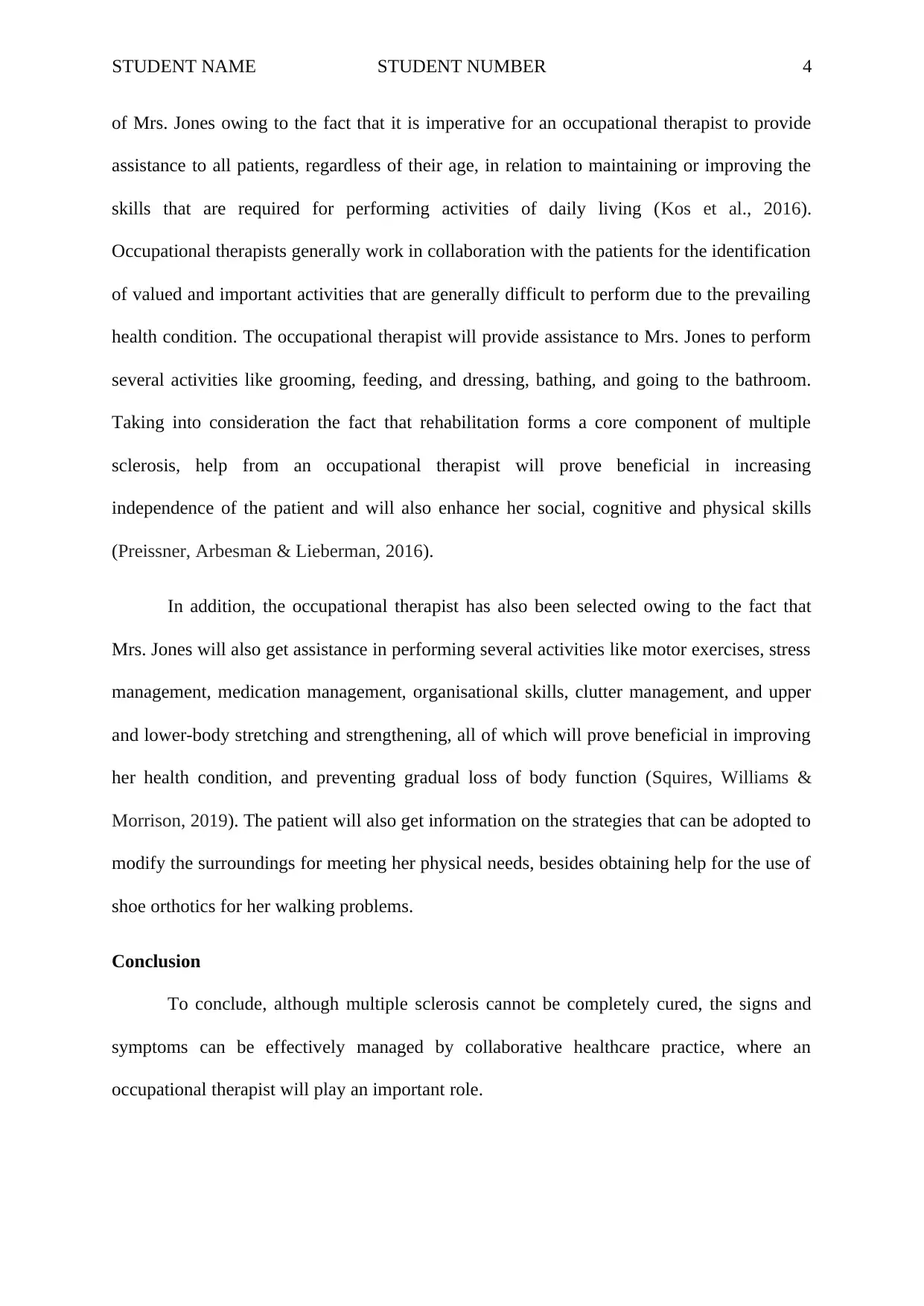
STUDENT NAME STUDENT NUMBER 4
of Mrs. Jones owing to the fact that it is imperative for an occupational therapist to provide
assistance to all patients, regardless of their age, in relation to maintaining or improving the
skills that are required for performing activities of daily living (Kos et al., 2016).
Occupational therapists generally work in collaboration with the patients for the identification
of valued and important activities that are generally difficult to perform due to the prevailing
health condition. The occupational therapist will provide assistance to Mrs. Jones to perform
several activities like grooming, feeding, and dressing, bathing, and going to the bathroom.
Taking into consideration the fact that rehabilitation forms a core component of multiple
sclerosis, help from an occupational therapist will prove beneficial in increasing
independence of the patient and will also enhance her social, cognitive and physical skills
(Preissner, Arbesman & Lieberman, 2016).
In addition, the occupational therapist has also been selected owing to the fact that
Mrs. Jones will also get assistance in performing several activities like motor exercises, stress
management, medication management, organisational skills, clutter management, and upper
and lower-body stretching and strengthening, all of which will prove beneficial in improving
her health condition, and preventing gradual loss of body function (Squires, Williams &
Morrison, 2019). The patient will also get information on the strategies that can be adopted to
modify the surroundings for meeting her physical needs, besides obtaining help for the use of
shoe orthotics for her walking problems.
Conclusion
To conclude, although multiple sclerosis cannot be completely cured, the signs and
symptoms can be effectively managed by collaborative healthcare practice, where an
occupational therapist will play an important role.
of Mrs. Jones owing to the fact that it is imperative for an occupational therapist to provide
assistance to all patients, regardless of their age, in relation to maintaining or improving the
skills that are required for performing activities of daily living (Kos et al., 2016).
Occupational therapists generally work in collaboration with the patients for the identification
of valued and important activities that are generally difficult to perform due to the prevailing
health condition. The occupational therapist will provide assistance to Mrs. Jones to perform
several activities like grooming, feeding, and dressing, bathing, and going to the bathroom.
Taking into consideration the fact that rehabilitation forms a core component of multiple
sclerosis, help from an occupational therapist will prove beneficial in increasing
independence of the patient and will also enhance her social, cognitive and physical skills
(Preissner, Arbesman & Lieberman, 2016).
In addition, the occupational therapist has also been selected owing to the fact that
Mrs. Jones will also get assistance in performing several activities like motor exercises, stress
management, medication management, organisational skills, clutter management, and upper
and lower-body stretching and strengthening, all of which will prove beneficial in improving
her health condition, and preventing gradual loss of body function (Squires, Williams &
Morrison, 2019). The patient will also get information on the strategies that can be adopted to
modify the surroundings for meeting her physical needs, besides obtaining help for the use of
shoe orthotics for her walking problems.
Conclusion
To conclude, although multiple sclerosis cannot be completely cured, the signs and
symptoms can be effectively managed by collaborative healthcare practice, where an
occupational therapist will play an important role.
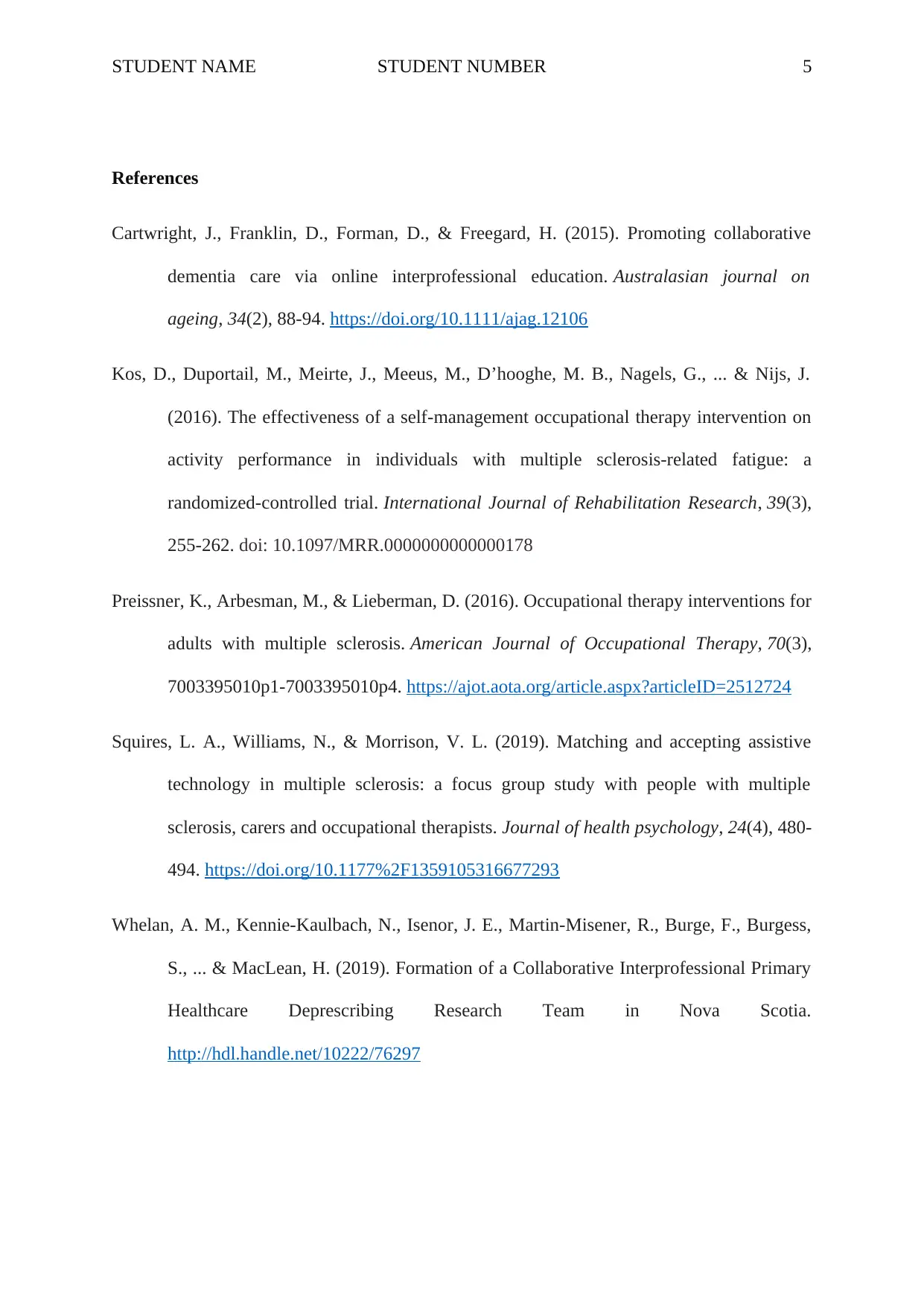
STUDENT NAME STUDENT NUMBER 5
References
Cartwright, J., Franklin, D., Forman, D., & Freegard, H. (2015). Promoting collaborative
dementia care via online interprofessional education. Australasian journal on
ageing, 34(2), 88-94. https://doi.org/10.1111/ajag.12106
Kos, D., Duportail, M., Meirte, J., Meeus, M., D’hooghe, M. B., Nagels, G., ... & Nijs, J.
(2016). The effectiveness of a self-management occupational therapy intervention on
activity performance in individuals with multiple sclerosis-related fatigue: a
randomized-controlled trial. International Journal of Rehabilitation Research, 39(3),
255-262. doi: 10.1097/MRR.0000000000000178
Preissner, K., Arbesman, M., & Lieberman, D. (2016). Occupational therapy interventions for
adults with multiple sclerosis. American Journal of Occupational Therapy, 70(3),
7003395010p1-7003395010p4. https://ajot.aota.org/article.aspx?articleID=2512724
Squires, L. A., Williams, N., & Morrison, V. L. (2019). Matching and accepting assistive
technology in multiple sclerosis: a focus group study with people with multiple
sclerosis, carers and occupational therapists. Journal of health psychology, 24(4), 480-
494. https://doi.org/10.1177%2F1359105316677293
Whelan, A. M., Kennie-Kaulbach, N., Isenor, J. E., Martin-Misener, R., Burge, F., Burgess,
S., ... & MacLean, H. (2019). Formation of a Collaborative Interprofessional Primary
Healthcare Deprescribing Research Team in Nova Scotia.
http://hdl.handle.net/10222/76297
References
Cartwright, J., Franklin, D., Forman, D., & Freegard, H. (2015). Promoting collaborative
dementia care via online interprofessional education. Australasian journal on
ageing, 34(2), 88-94. https://doi.org/10.1111/ajag.12106
Kos, D., Duportail, M., Meirte, J., Meeus, M., D’hooghe, M. B., Nagels, G., ... & Nijs, J.
(2016). The effectiveness of a self-management occupational therapy intervention on
activity performance in individuals with multiple sclerosis-related fatigue: a
randomized-controlled trial. International Journal of Rehabilitation Research, 39(3),
255-262. doi: 10.1097/MRR.0000000000000178
Preissner, K., Arbesman, M., & Lieberman, D. (2016). Occupational therapy interventions for
adults with multiple sclerosis. American Journal of Occupational Therapy, 70(3),
7003395010p1-7003395010p4. https://ajot.aota.org/article.aspx?articleID=2512724
Squires, L. A., Williams, N., & Morrison, V. L. (2019). Matching and accepting assistive
technology in multiple sclerosis: a focus group study with people with multiple
sclerosis, carers and occupational therapists. Journal of health psychology, 24(4), 480-
494. https://doi.org/10.1177%2F1359105316677293
Whelan, A. M., Kennie-Kaulbach, N., Isenor, J. E., Martin-Misener, R., Burge, F., Burgess,
S., ... & MacLean, H. (2019). Formation of a Collaborative Interprofessional Primary
Healthcare Deprescribing Research Team in Nova Scotia.
http://hdl.handle.net/10222/76297
⊘ This is a preview!⊘
Do you want full access?
Subscribe today to unlock all pages.

Trusted by 1+ million students worldwide
1 out of 6
Related Documents
Your All-in-One AI-Powered Toolkit for Academic Success.
+13062052269
info@desklib.com
Available 24*7 on WhatsApp / Email
![[object Object]](/_next/static/media/star-bottom.7253800d.svg)
Unlock your academic potential
Copyright © 2020–2026 A2Z Services. All Rights Reserved. Developed and managed by ZUCOL.





